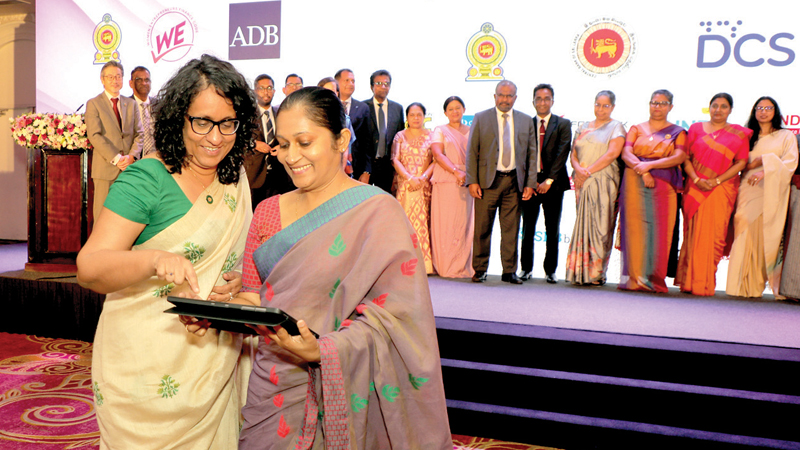When women secure financial support, they don’t just build businesses—they strengthen families and communities. They reinvest in education, create jobs and drive economic progress. Yet, many women entrepreneurs struggle to access funding, resulting in a vast pool of untapped potential. Giving them the opportunities they deserve isn’t just fair—it’s smart economics. In this backdrop, it is heartening to note that Sri Lanka is among the first 24 developing countries and the first in South Asia to pilot the Women Entrepreneurs’ Finance Code (WE Finance Code)
The WE Finance Code, a global initiative funded by the Women Entrepreneurs Finance Initiative (We-Fi), was launched at an event in Colombo on March 18, with Prime Minister Dr Harini Amarasuriya as the Chief Guest. This launch was a collaborative effort between the Asian Development Bank (ADB) and the Ministry of Finance, Planning, and Economic Development.
As emphasised by Prime Minister Dr. Amarasuriya, the economic participation of women remains a significant global concern. “The gender disparity is evident, with the International Labour Organization (ILO) reporting that only 47 percent of the world’s women participate in the Labour Force, compared to 72 percent of men. The World Economic Forum’s Global Gender Gap Report 2024 estimates a gender parity score of 60.5 percent in terms of economic participation and opportunities for women globally,” she said.
Local situation
The disparity in Sri Lanka also reflects this global trend. Despite women constituting more than half of the population, their involvement in the formal economy is disproportionately low with only 32 percent of women of working age being economically active compared to 71 percent of men. As evidenced by the 2013-2014 economic census done by the Department of Census and Statistics on non-agricultural economic activities, women’s participation in entrepreneurship and business activities is significantly lower than men’s, with only 25 percent of businesses and 26 percent of micro-businesses being women-led.
Factors contributing to the under-representation
As Prime Minister Dr. Amarasuriya highlighted, there are systemic barriers to entrepreneurship, such as limited access to finance, markets, skilled labour and technology, that restrain women’s ability to start or scale up their businesses. “Women are also constrained by a lack of safe and reliable public transport and safety at the workplace”, she added.
Deep-rooted societal expectations place domestic responsibilities on women, leaving them with limited time, resources or energy to engage in economic activity. The gender division of unpaid household care work further marginalises women from economic participation, she said.
Regarding access to finance, micro, small, and medium-sized enterprises (MSMEs) worldwide face barriers like low financial literacy, lack of collateral, and the absence of formal business structures.
The International Financial Corporation’s MSME Finance Gap Report in 2017 estimates that the global finance gap for MSMEs in developing countries amounts to US$ 5.2 trillion in formal MSMEs and US$ 2.9 trillion in informal MSMEs. For Sri Lanka, this finance gap is around US$ 17 billion, representing approximately 21 percent of the country’s GDP.
As the Prime Minister said, for WMSMEs (women-led MSMEs), this barrier is not only present but significantly heightened, further hindering their growth and potential and said, “WMSMEs are disproportionately affected by this financing gap, which not only hampers the growth potential of women-led businesses but also slows overall socio-economic development.”
Closing the financing gap for women entrepreneurs is not only crucial to promote gender equality but also to foster economic growth, Dr.Amarasuriya emphasised. Globally, it is estimated that closing this gap could create an additional US dollars 5 to 6 trillion in economic value.
Significance
The Women Entrepreneurs Finance Code has been introduced as a means to support WMSMEs to bridge this gap. The Code is a global commitment from financial service providers, regulators, development banks, and other ecosystem players to promote access to finance for women entrepreneurs through three focal areas of commitment – leadership, action, and data.
It is anticipated that the economic empowerment of WMSMEs will help women to expand, create jobs, and contribute to economic development. “Overall, the Women Entrepreneurs’ Finance Code focuses on the use of a multi-stakeholder, data-driven approach to identify the specific needs of WMSMEs and tailor financial and non-financial support accordingly. Sri Lanka is one of the first 24 developing countries where the Women Entrepreneurs’ Finance Code is being piloted and I am particularly pleased about that,” she added.
While appreciating the ADB’s decades-long technical assistance for countless projects including this initiative, the Prime Minister emphasised that addressing these barriers and closing the gender gap in economic participation is vital to the government’s commitment to ensuring economic democracy. She noted that such efforts would not only empower women but also drive the country’s economic development.
“Sri Lanka can foster an environment where WMSMEs are thriving and become a key driver of economic progress. Sri Lanka has successfully formulated the National Definition for Women-Led Business in August 2024, driven by the Ministry of Finance, Planning and Economic Development and the Central Bank of Sri Lanka. It is anticipated that this definition will be the first step towards ensuring consistency in data collection and reporting towards improved data-driven policy-making to enhance access to finance for WMSMEs. The Government is also working to establish a national coalition towards successfully launching the WeFinance Code and facilitating a sustainable ecosystem comprising stakeholders in the public, private, and financial sectors for the empowerment of WSMEs in Sri Lanka,” Dr.Amarasuriya added.
CB Governor’s views
 Delivering the keynote speech, Governor of the Central Bank, Dr. Nandalal Weerasinghe reiterated that increasing labour force participation, especially through greater female involvement in entrepreneurship and business development, is essential for boosting growth and productivity.
Delivering the keynote speech, Governor of the Central Bank, Dr. Nandalal Weerasinghe reiterated that increasing labour force participation, especially through greater female involvement in entrepreneurship and business development, is essential for boosting growth and productivity.
“The Central Bank is privileged to share our vision for a more inclusive financial ecosystem, one that empowers individuals and businesses with a special focus on women that contributes to the nation’s economic growth and development,” he said.
Dr. Weerasinghe added that empowering women economically not only benefits them individually, but also leads to a more inclusive and prosperous society. When women have access to finance and the ability to control their economic futures, they invest in their families, communities, and businesses. Evidence shows that women’s economic empowerment generates a multiplier effect contributing to national development and improving overall societal well-being.
In this context, women entrepreneurs who represent a significant yet unutilised portion of the MSME sector must receive the support necessary for their success.
The Central Bank led the development of Sri Lanka’s first-ever financial literacy roadmap, officially launched in 2024. This roadmap provides an evidence-based policy framework designed to positively influence the financial behavior of all Sri Lankans, both men and women.
The first phase of the National Financial Inclusion Strategy was completed at the end of 2024. “We are currently evaluating the outcomes and overall impact to inform the second phase, which will focus on evidence-based policy initiatives to further strengthen financial inclusion. Financial inclusion goes beyond access to financial services. It is about creating and enabling an environment where every individual, both men and women, has the opportunity to improve their lives through access to credit, savings, insurance, and other essential financial services”, he said.
Power of resilience and innovation
Women entrepreneurs are at the forefront of both resilience and innovation, said ADB Country Director for Sri Lanka Takafumi Kadono. ADB WE-Fi program has provided over 1,500 women-owned SMEs access to finance, and 620 have had access to financial skills training. The ‘SME Connect’ platform initiated under the WE-Fi program is enabling a larger number of women entrepreneurs to access free information and training online and creating opportunities for networking and mentoring, Kadono added.
He also highlighted the impact of women-led businesses in job creation and resilience. He cited Pradipa Nilanthi from Moneragala, who, with support from the ADB We-Fi program in 2019, expanded her handbag business which was started in 2014, doubling production and employing 14 women. This, the Country Director said, reflects a broader trend of women entrepreneurs supporting other women.
“Given the urgent need to accelerate women’s labor force participation, which remains shockingly low at around 30 percent in Sri Lanka, investing in women entrepreneurs is crucial for national economic growth. While significant progress has been made in supporting women entrepreneurs of the likes of Pradeepa to start and grow their businesses, much more needs to be done to unlock the true potential of the many women entrepreneurs who remain underserved”, Kadono added.
With ADB’s support, Sri Lanka achieved two key milestones last year: adopting its first national definition of women-owned businesses and requiring financial institutions, through a Central Bank directive, to report sex-disaggregated data quarterly. These steps strengthen SME policies to better support women entrepreneurs.
While the national adoption of the Code is an important milestone, it marks the start of the real journey towards implementation and integration of the Code’s objectives into national policies and business practices. Translating this commitment into action should include the development of new financial products and services targeted to women borrowers, as well as annual reporting of data and gender-responsive policies that can better support women entrepreneurs to thrive, the Country Director emphasised.









